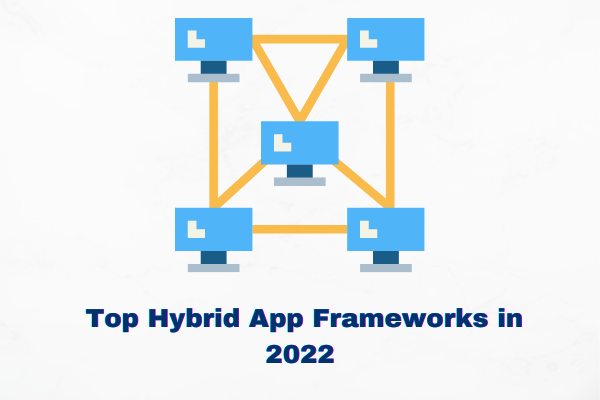The 10 Best Hybrid App Frameworks to Help You Succeed in 2022

You may have heard of hybrid apps, but you aren’t entirely sure what they are or how they work.
Hybrid apps (also known as cross-platform mobile apps) are apps that contain both web app and native mobile app components, allowing them to be built using technology from both web developers and native app developers.
This article explains the ten most promising hybrid app frameworks to watch in 2022 and beyond—so you can better prepare your business for the future and provide an overview of what’s in store for the future of this type of app development in 2022.
Here we go!
1) Telerik Platform
Telerik Platform allows users to develop UI components and plugins specifically designed for use in native, hybrid, and web apps. This framework has a wide array of customizable features and boasts native support for all leading platforms.
Plus, it has a vast library repository that makes coding more accessible than ever before. However, its most notable feature is code sharing. With Telerik Platform, developers can reuse up to 95 percent of their code across every platform they target.
That means you don’t have to spend time rewriting your app from scratch every time you want to launch on a new platform—saving you both time and money.
2) Ionic
Hybrid app frameworks, such as Ionic and Apache Cordova, make it easy to build native-like mobile apps using web technologies like HTML5, CSS3, and JavaScript.
These hybrid app frameworks also let you add native functionality to your app using mobile-specific APIs. Ionic is one of our favorite hybrid app frameworks for its ease of use and wide range of out-of-the-box features, such as Google Maps integration and prebuilt components that cover common use cases like navigation or form validation.
3) React Native
React Native would be in the first place if there were a framework battle right now. This open-source, cross-platform solution is growing at an insane rate, and many companies are using it for their hybrid apps.
The versatility of React Native is one of its best features since it allows developers to create native apps with a Javascript approach. The downside is that RN requires a steeper learning curve than other frameworks on our list.
4) Xamarin
Xamarin is a cross-platform mobile app development platform. It allows developers to write code once and compile it into native Android, iOS, and Windows Mobile apps.
Xamarin has been around since 2011 and was acquired by Microsoft in 2016. Since then, its popularity has skyrocketed as more organizations are looking to develop their mobile apps using C#.
With Xamarin, you can build native apps with .NET Standard 2.0 or C# 7.0 and use frameworks like MVVM Light Toolkit or Caliburn Micro instead of reinventing them from scratch.
5) Meteor
If you need an easy-to-use hybrid app framework that works with various front-end and back-end languages, Meteor might be your best bet. Meteor has its template engine, making it easier to use than most other frameworks.
In addition, it is extremely simple to set up a new project with Meteor. Simply type Meteor and create [project name] from within your current directory, and Meteor will build everything you need to get started with your new app.
6) CORDOVA (Apache Cordova )
The Apache Cordova platform allows mobile application developers to build native applications using Web technologies like HTML, CSS, and JavaScript instead of relying on native languages such as Java or Objective-C.
The result is a fast and powerful app that can be deployed across multiple platforms without a developer needing to write for each one individually. Cordova has been used to create apps for everything from medical devices to Facebook’s Paper app.
7) Onsen UI
Onsen UI is one of our favorite hybrid app frameworks for a good reason. It’s completely free, which makes it a great solution for bootstrapping companies just starting.
Onsen UI supports a wide variety of mobile platforms, including React Native, and boasts impressive documentation, which is rare in today’s landscape of hybrid frameworks. If you’re looking to build your first hybrid app, we recommend checking out Onsen UI.
8) Cordova CLI Toolkit
Apache Cordova is an open-source mobile application development framework that allows for quick mobile app development using Web technologies like HTML, CSS, and JavaScript.
Its core features include bug management, lifecycle management, build management, and cloud integration. Although it is not as simple as React Native CLI, it is still a popular option for the top hybrid mobile app development company in India.
9) Oride UI
Whether you’re building an app for your company or your personal use, you need to ensure it’s a great experience. A hybrid app (half native, half web) is an incredibly flexible way to build apps quickly and easily without sacrificing functionality.
Oride UI is one of my favorite frameworks—but they are not paying me to write about them; I like their service.
It also comes with everything you need built-in, so you don’t have to worry about plugins or add-ons–start building.
If something is missing from their library, they have documentation on creating custom elements that make extending existing components easy.
10) Flutter
Flutter is Google’s SDK for building native mobile apps in C++, JavaScript, and Dart. Originally developed at Google, Flutter allows developers to code using a single codebase to build applications for both iOS and Android.
It uses its rendering engine (Skia) and its plugin interface to access underlying device functionality. In addition to these features, Flutter also provides a rich set of UI components designed with Material Design principles in mind.
As of version 1.0, released on February 15th, 2018, Flutter has support for creating iOS and Android apps and web applications using Chrome or Safari browsers. In addition to these features, it also provides a rich set of UI components designed with Material Design principles in mind.
Read Also: Top 10 Android App Development Frameworks You Should Know About in 2022
Conclusion
The future of hybrid app development is as solid as ever, with numerous high-quality frameworks entering the market and filling in some of their competitors’ missing features.
Given how far these hybrid app development frameworks have come in such a short time, we will likely see developers continue to gravitate towards them for years to come.
While hybrid app development frameworks may not be able to match native apps feature-for-feature, they offer an ideal solution for businesses who need something more than a mobile website but don’t want to sacrifice user experience or functionality.
Hybrid apps are here to stay; get on board today.






